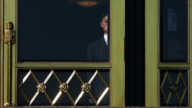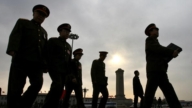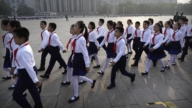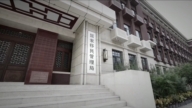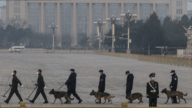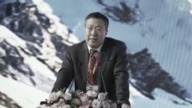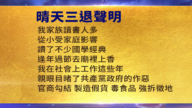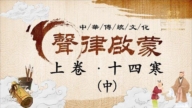【新唐人2013年10月02日讯】近来,中共领导人习近平对当今中国社会道德沦丧、笑贫不笑娼的风气深感忧心,他希望通过发扬儒家、道家和佛教等中国的传统文化,来遏制腐败的蔓延和滋生,弥补中国社会的“道德真空”。但是有人质疑,无神论的中共政权,倡导神、佛的传统文化,是别有用心,是企图转移普通民众的视线,和他们对贪官腐败与霸占土地等强权的不满。
根据英国《路透社》报导,习近平认为,因为中国的经济发展和全民以致富为荣,造成了中国社会的“道德真空”,道德准绳缺失的价值观体系,为贪污腐败提供了沃土,因此反腐运动只能治标,而不能治本。
消息人士说,习近平希望通过发扬儒家、道家和佛教等中国的传统文化,遏制腐败的蔓延和滋生。
美国南加州大学公共政策博士叶科:“这种道德缺失并不是因为经济发展的缘故,你看南韩、台湾,他们也是经济发展了,但是为什么道德没有缺失呢。这实际上是因为中共对传统文化的破坏,中共无神论的宣传,对传统文化的抹黑摧残,对各种信仰团体打压。”
时事评论员任百鸣:“我觉得,与其说是恢复传统文化来救中国,不如看看谁是真正破坏中国传统文化的那些人,把这些人绳之以法,我觉得才是当务之急,才是有一个明确的态度,这样才有可能走下一步。”
中共最高法院今年3月公布报告显示,2008年至2012年,大约有14万3000名政府官员被控贪腐和渎职,平均每天有78人。
叶科:“现在整个社会危机四伏,它就需要别的手段来继续的欺骗百姓,包括这个传统文化,它实际上是为了想利用来解决中共自己腐败问题,它是为了中共的政治目地服务,为了继续维持共产党的专制统治。”
在中国的《宪法》中,明确规定了民众享有宗教信仰的自由。而中共政权从1999年开始,全面禁止民众信仰“法轮功”,对于一切活动公开的法轮功修炼者,进行残酷迫害,多少人被捕入狱,这是在其他国家看不到的现象。
美国的“人权观察”组织资深分析员林伟(Nicholas Bequelin)说,“中国的宗教必须要为国家服务,中国虽然泛泛的规定了宗教自由,但容许自由到何种程度,令人质疑。政府是一手宽松,一手镇压。”
美国“南加州大学”公共政策博士叶科强调,在中国,只要是有可能威胁到中共统治地位的宗教势力或团体,不管事实如何,中共一律镇压。
叶科:“在传统文化和信仰问题上,不管现任高层怎么说,他们如何对待法轮功就是一块基本的试金石。你想,只要对千百万法轮功学员迫害、对真善忍信仰的迫害还在持续,那中国社会的道德重建,传统道德的恢复,根本就是空谈。”
在信仰多元化的国家,相对也是民主性较高的国家,他们不仅尊崇传统信仰,也能敞开胸怀接受外来的宗教思想。而信仰“无神论”的共产党,与中国传统的文化和信仰完全格格不入,中共善于用暴力制造恐惧,用谎言蛊惑人心。
1941年,美国总统富兰克林‧德拉诺‧罗斯福,在美国国会上,建议成立“联合国”。他在发言中提出了人类具有四个自由的概念,其中包括“信仰自由”,后来被明确为“宗教自由”。
根据《公民权利和政治权利国际公约》第十八条第一项规定:人人有思想、良心和宗教自由的权利。虽然中共政权于1998年10月5号,在纽约联合国总部,签署了《公民权利和政治权利国际公约》,但是直到今天,中共人大还没有批准这份公约。
采访/陈汉 编辑/黄亿美 后制/郭敬
Anti-corruption fail? Xi Jinping turns to traditional culture
Recently, the Chinese leader Xi Jinping is feeling deeply
worried about the moral decay of today’s Chinese society
and the poverty is more shameful than prostitution.
Xi has tried to promote Confucianism, Taoism, Buddhism
and other Chinese traditional culture to curb the spread
and breeding of corruption, and to turn Chinese society
into a “moral vacuum."
However, it was questioned whether the atheistic communist
regime has an ax to grind in advocating God
and Buddha’s traditional culture.
They are attempting to divert the general public’s attention
and dissatisfaction from corruption and appropriating the land.
According to the British Reuters, Xi Jinping thinks China’s
economic development and glory in getting rich
resulted in a Chinese society “moral vacuum."
A system with a missing moral dimension can provide
a fertile ground for corruption.
Thus, the anti-corruption campaign can only scratch
the surface.
The source said Xi Jinping hopes to promote Confucianism,
Taoism, Buddhism and China’s traditional culture to curb
the spread and breeding of corruption.
University of Southern California, Public Policy, Dr. Ye Ke:
“Economic development is not the reason for moral flaws.
You can tell, Korea and Taiwan also have economic growth,
but why don’t they have moral flaws?
The moral flaws are because of the CCP’s long-term
continual destruction of traditional culture, especially
the propaganda of atheism and the suppression
of various faith groups."
Commentator Ren Baiming: “I think it’s better to find out
who are the exact people destructing the traditional Chinese
culture than to restore traditional Chinese culture
in order to rescue.
It needs to bring these people to justice;
then it’s possible to take the next step."
This year, the CPC Supreme Court report revealed that
in March from 2008 to 2012, there were about 143,000
government officials accused of corruption
and dereliction of duty.
The daily average was 78 people.
Ye Ke:"The whole community is loaded with danger.
It is necessary to continue to deceive the people
with other means including traditional culture.
They are using traditional culture to solve corruption
in the CCP and to serve the CCP’s political purpose under a tyranny."
China’s “Constitution" expressly provides for the freedom
of religious belief.
The communist regime has totally prohibited public faith
in Falun Gong since 1999.
They banned all public activities
of Falun Gong practitioners.
Many practitioners are suffering brutal persecution
and are put in jail.
You can’t find the same situation in other countries.
Senior analyst Lin Wei (Nicholas Bequelin),
Human Rights Watch, American division,
said religion must serve the country in China.
It’s questioned to what extent religious freedom
can be allowed.
Government loosens in one hand and suppresses in the other.
Dr. Ye Ke, U.S. “University of Southern California, “Public
Policy stresses religious groups will all be suppressed as
long as they are likely to threaten the CCP’s dominance;
no matter what the truth is."
Ye Ke: “The way they treat Falun Gong is a touchstone in
matters of traditional culture and faith, no matter what the
current senior incumbent says.
The moral restoration and reconstruction is all empty talk
as long as the persecution of the millions of Falun Gong
practitioners and the faith of Truthfulness continues."
Religiously diverse countries also have a relatively high
level of democracy.
They not only respect traditional beliefs, but also openly
accept foreign religions.
Believing in atheism, the CCP is good at using violence
to create fear and seducing the people with lies
which goes against the grain of traditional culture and religion.
In 1941, U.S. President Franklin Delano Roosevelt proposed
the establishment of the United Nations in the U.S. Congress.
His speech presented the concept of four human freedoms,
including the freedom of religion,
which was later explicitly defined as religious freedom.
According to “Civil and Political Rights, the International
Covenant," the first paragraph of Article XVIII states that
everyone has thought, conscience and religious rights.
Although the Communist regime signed the “Civil and
Political Rights, the International Covenant" at the United
Nations Headquarters in New York on October 5th, 1998,
the CCP Congress has not yet ratified this convention.


